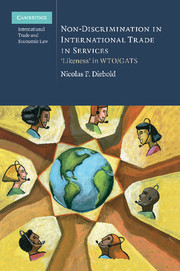Book contents
- Frontmatter
- Contents
- Foreword
- Acknowledgements
- Abbreviations
- List of Cases
- List of Legal Texts
- List of Documents
- Introduction
- PART I Foundations
- 1 Objective and forms of non-discrimination
- 2 Particularities of trade in services and GATS
- 3 Legal elements of non-discrimination obligations
- 4 Concluding summary: reconciling the three elements
- PART II Framing the conceptual breadth of ‘likeness’ in GATS
- PART III GATS specific ‘likeness’ issues
- PART IV Methodology for the ‘likeness’ analysis in GATS
- Bibliography
- Index
3 - Legal elements of non-discrimination obligations
Published online by Cambridge University Press: 10 January 2011
- Frontmatter
- Contents
- Foreword
- Acknowledgements
- Abbreviations
- List of Cases
- List of Legal Texts
- List of Documents
- Introduction
- PART I Foundations
- 1 Objective and forms of non-discrimination
- 2 Particularities of trade in services and GATS
- 3 Legal elements of non-discrimination obligations
- 4 Concluding summary: reconciling the three elements
- PART II Framing the conceptual breadth of ‘likeness’ in GATS
- PART III GATS specific ‘likeness’ issues
- PART IV Methodology for the ‘likeness’ analysis in GATS
- Bibliography
- Index
Summary
The structure of any non-discrimination obligation, including national treatment and most-favoured-nation (MFN) treatment, consists of two principal elements that are comparative in nature. The first element of ‘less favourable treatment’ requires a comparison between the treatments accorded to the objects at issue (which are, in the case of trade, imported versus domestic goods and services) in order to assess whether one is treated less favourably than the other. The second element of ‘likeness’ calls for a comparison between the objects of the treatment. The two elements of ‘likeness’ and ‘less favourable treatment’ are cumulative in nature. An additional and third element that needs to be taken into account when speaking of non-discrimination relates to the regulatory purpose of the measure at issue. In particular the question of whether and how the regulatory purpose of a discriminatory measure should be considered under the legal analysis of WTO law has led to considerable controversy among trade practitioners and scholars.
At the outset it must be noted that each of these three elements should never be examined in complete isolation, but always in context of their mutual relationship. An integral view is important because the interpretation of one element may have a certain effect on the interpretation of another element. For instance, formulated in the abstract, a broad interpretation of the ‘likeness’ concept may require narrowly interpreting ‘less favourable treatment’ or taking into account the regulatory purpose in order to avoid an overly intrusive application of the non-discrimination provisions.
- Type
- Chapter
- Information
- Non-Discrimination in International Trade in Services‘Likeness' in WTO/GATS, pp. 32 - 93Publisher: Cambridge University PressPrint publication year: 2010

